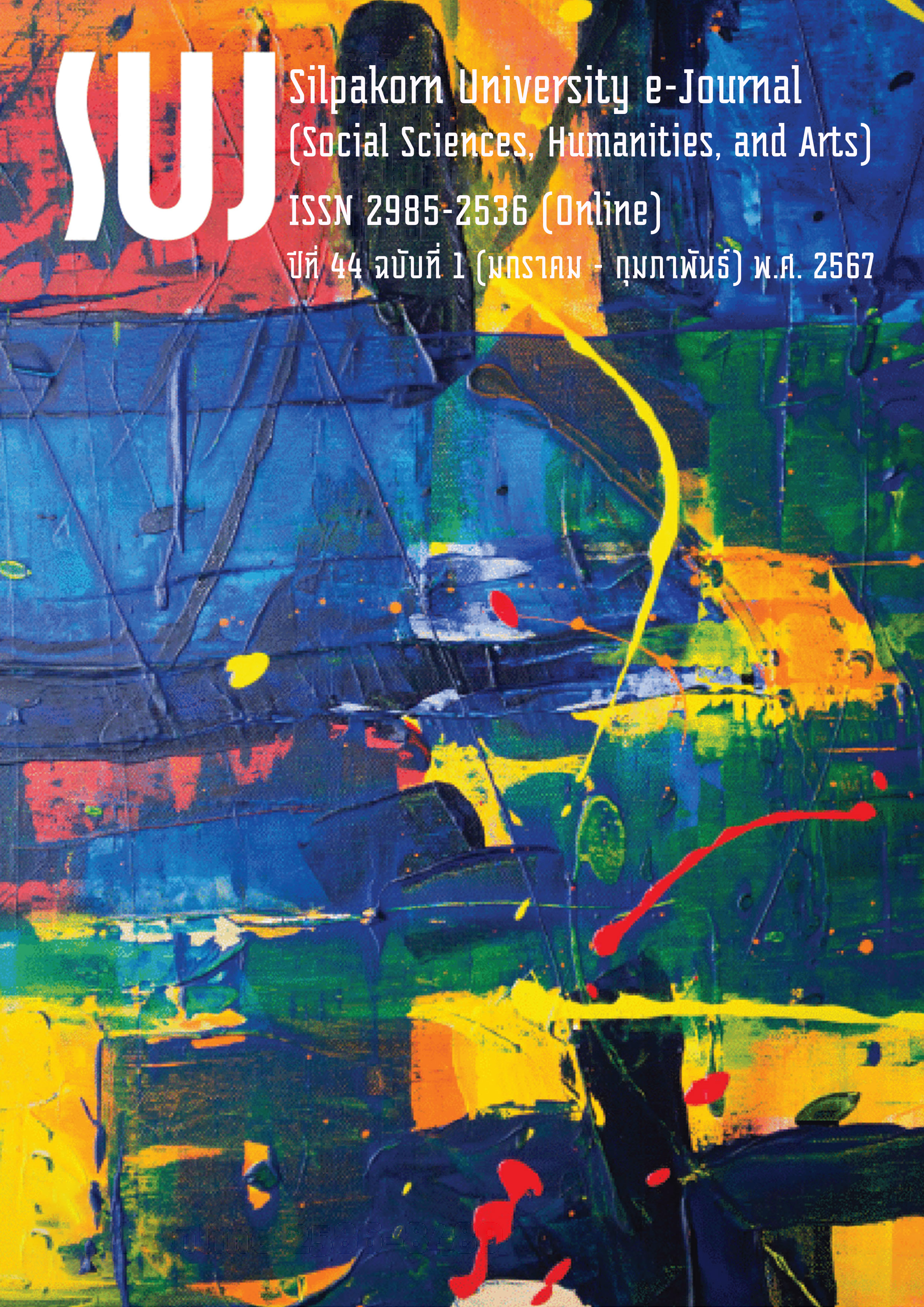ปัจจัยที่มีผลต่อบทบาทการดูแลการใช้งานสื่อออนไลน์ของผู้ปกครองเด็กปฐมวัย โรงเรียนเอกชน จังหวัดสมุทรปราการ (Factors influencing the role of parental mediation and supervision in the use of online media by kindergarten students in a private school in Samut Prakan Province)
Main Article Content
Abstract
บทความนี้เป็นส่วนหนึ่งของการศึกษาวิจัย เรื่อง ปัจจัยที่มีผลต่อบทบาทการกำกับดูแลและการเป็นสื่อกลางของผู้ปกครองในการใช้งานสื่อออนไลน์ของเด็กปฐมวัย โรงเรียนเอกชน จังหวัดสมุทรปราการ มีวัตถุประสงค์เพื่อ 1) ศึกษาปัจจัยส่วนบุคคลของผู้ปกครองที่มีผลต่อบทบาทการกำกับดูแลในการใช้งานสื่อออนไลน์ของเด็กปฐมวัย 2) ศึกษาความสัมพันธ์ของระดับพฤติกรรมการใช้งานสื่อออนไลน์ของผู้ปกครองร่วมกับบุตรหลานที่มีผลต่อบทบาทการกำกับดูแลการใช้งานสื่อออนไลน์ของเด็กปฐมวัย 3) ศึกษาความสัมพันธ์ของระดับสมรรถนะการรู้เท่าทันสื่อ สารสนเทศ และดิจิทัล (Media Information and Digital Literacy: MIDL) ของผู้ปกครองที่มีผลต่อบทบาทการกำกับดูแลการใช้งานสื่อออนไลน์ของเด็กปฐมวัย โดยกลุ่มตัวอย่าง คือ ผู้ปกครองของนักเรียนชั้นอนุบาล 1-3 โรงเรียนเอกชน จังหวัดสมุทรปราการ ปีการศึกษา 2564 จำนวนทั้งสิ้น 391 คน เครื่องมือที่ใช้ในการวิจัย คือ แบบสอบถามออนไลน์ และการเก็บข้อมูลเชิงคุณภาพด้วยการสัมภาษณ์ ในช่วงระหว่างเดือนกรกฎาคม-กันยายน 2564 ทำการวิเคราะห์ข้อมูลด้วยสถิติเชิงบรรยาย เปรียบเทียบความแปรปรวนของประชากรสองกลุ่ม (F-test) เปรียบเทียบความแตกต่างระหว่างตัวแปรสองตัวที่เป็นอิสระต่อกัน (t-test) วิเคราะห์ความแปรปรวนทางเดียว และสหสัมพันธ์ ผลการศึกษา พบว่า ปัจจัยด้านอายุของผู้ปกครองมีผลต่อบทบาทการกำกับดูแลและการเป็นสื่อกลางในการใช้งานสื่อออนไลน์ของบุตรหลานในรูปแบบ Co-use parental mediation (แบบรับรู้การใช้งานร่วมกัน) แตกต่างกันในกลุ่มของผู้ปกครองที่มีอายุต่ำกว่า 30 ปี กับ 30-39 ปีและช่วงอายุ 40 ปีขึ้นไป ในภาพรวมพบว่า ผู้ปกครองมีพฤติกรรมการใช้งานร่วมกับเด็กในระดับมาก และมีระดับสมรรถนะการรู้เท่าทันสื่อฯ (MIDL) อยู่ในระดับดี ซึ่งส่งผลให้ผู้ปกครองมีระดับการกำกับดูแลและการเป็นสื่อกลางในการใช้งานสื่อออนไลน์ของบุตรหลานในระดับมาก ผลจากการศึกษาครั้งนี้สามารถนำมาใช้ประโยชน์ในการส่งเสริมความรู้และทักษะการกำกับดูแลและการเป็นสื่อกลางในการใช้งานสื่อออนไลน์ของผู้ปกครองเด็กปฐมวัย เพื่อให้เกิดการใช้งานสื่อออนไลน์ได้อย่างเหมาะสมในกลุ่มเด็กปฐมวัย
This article is part of a research study entitled “Factors Influencing the Role of Guidance and Mediation by Parents in the Use of Online Media by Kindergarten Students in Private Schools in Samut Prakan Province.” The objectives of this study are to 1) examine personal factors of parents that affects the role of guidance and supervision in the use of online media by kindergarten students, 2) explore the relationship between parents’ online media usage behavior and their children’s behavior, as well as the parental guidance and mediation roles in the use of online media in early childhood children, and 3) investigate the relationship between parents’ media and digital literacy levels and their guidance and mediation roles in the online media use of early childhood children. The sample group was the parents of kindergarten students in grades 1-3 in a private school in Samut Prakan Province, academic year of 2021, with a total of 391 participants. The research tools used in this research were online questionnaire and qualitative research through interviews conducted between July-September of 2021. The data were analyzed using Descriptive Statistics, F-test, Independent Sample t-test, One-way Analysis of Variance (One-way ANOVA), and Correlation Analysis. The results of this research revealed that parents of different age groups had significant differences in the level and pattern of supervision, The level of media co-use between children and parents is high, and their level of online media and digital literacy affected a high level of supervision and mediation in online media usage. These findings can be beneficial in promoting knowledge and skills of supervision and mediation in the use of online media among parents of the children in the early childhood stage, fostering appropriate online media use among young children.
Downloads
Article Details

This work is licensed under a Creative Commons Attribution-NonCommercial-NoDerivatives 4.0 International License.
References
Child and Youth Media Institute. (2020). Indicators of Media Information and Digital Literacy for Democratic Citizen (ตัวบ่งชี้การรู้เท่าทันสื่อ สารสนเทศ และดิจิทัลระดับบุคคลเพื่อส่งเสริมความเป็นพลเมืองประชาธิปไตย). [Online]. Retrieved March 20, 2022 from http://cclickthailand.com/wp-content/uploads/2020/07/ตัวบ่งชี้สสย-ฉบับสมบูรณ์-15-มีนาคม-ดร.อุษา-บิ้กกิ้นส์.pdf
Council on Communications and Media. (2016). Media and young minds. Pediatrics, 138(5): e20162591.
Hibbs, Pawinee, & Kulapichitr, Udomluck. (2016). Roles of parental mediation for promoting media literacy of preschoolers in Child Development Centers in the Bangkok Metropolis (บทบาทของผู้ปกครองในการเป็นสื่อกลางเพื่อส่งเสริมการรู้เท่าทันสื่อของเด็กปฐมวัยในศูนย์พัฒนาเด็กก่อนวัยเรียนกรุงเทพมหานคร). An Online Journal of Education, 11(1): 18-29.
Hutton, J. S., Horowitz-Kraus, T., Mendelsohn, A. L., DeWitt, T., Holland, S. K., & C-MIND Authorship Consortium. (2015). Home reading environment and brain activation in preschool children listening to stories. Pediatrics, 136(3): 466-478.
Kaenkrai, Arthittaya, & Ketkaew, Kulthida. (2021). Nurse’s roles on electronic screening media use in early childhood: Recommendations on empirical Evidences (บทบาทพยาบาลต่อการใช้สื่อหน้าจออิเล็กทรอนิกส์ในเด็กปฐมวัย: ข้อแนะนำตามหลักฐานเชิงประจักษ์). Thai Journal of Health Education, 44(1): 39-48.
Kirwil, L. (2009). Parental mediation of children’s internet use in different European countries. Journal of Children and Media, 3(4): 394-409.
Kleebpung, Nonthasruang, Plitponkarnpim, Adisak, Khamnong, Thirata, Lertawasadatrakul, Orapin, Ruksee, Nootchanart, Permpoonputtana, Kannika, & Chumchua, Vasunun. (2021). The Effects of Digital Device on Human Development in 21st Century (ผลกระทบของสื่อดิจิทัลที่มีผลต่อพัฒนาการมนุษย์ในศตวรรษที่ 21). Nakhon Pathom: National Institute for Child and Family Development, Mahidol University.
Kreetapirom, Piyawut. (2020). Screentime and Child’s Health (เวลาหน้าจอ สุขภาพของลูก). [Online]. Retrieved March 20, 2022 from https://mali.me/guide/screen-time-for-babies
Leethochawalit Atthanuphan, Manita, & Pechkoom, Orrakarn. (2015). Technology for young children: The suitable way of using (เทคโนโลยีกับเด็กปฐมวัยใช้อย่างไรให้พอดี). Journal of Education Silpakorn University, 13(1): 23-34.
Livingstone, S., & Helsper, E. J. (2008). Parental mediation of children’s internet use. Journal of Broadcasting & Electronic Media, 52(4): 581-599.
National Statistical Office, Ministry of Digital Economy and Society. (2021). The ITU Indicators from the 2021 Household Survey on the Use of Information and Communication Technology (รายงานตัวชี้วัด ITU โครงการสำรวจ ICT ครัวเรือน 2564). [Online]. Retrieved January 3, 2023 from https://www.nso.go.th/sites/2014/DocLib13/ด้านICT/ตัวชี้วัดITU/ITU_64.pdf
Nikken, P., & Jansz, J. (2014). Developing scales to measure parental mediation of young children’s internet use. Learning, Media and Technology, 39(2): 250-266.
Nikken, P., & Opree, S. J. (2018). Guiding young children’s digital media use: SES-differences in mediation concerns and competence. Journal of Child and Family Studies, 27(1): 1844-1857.
Sansri, Thitamon. (2021). The Study of Media Information and Digital Literacy (MIDL) and the Ability in Educating and Regulating the Online Media Usage of Parents with High School Children (การศึกษาความสัมพันธ์ของการรู้เท่าทันสื่อ สารสนเทศ และดิจิทัล กับความสามารถในการให้ความรู้และการกำกับดูแลพฤติกรรมการใช้สื่อออนไลน์ ของผู้ปกครองที่มีบุตรหลานในระดับชั้นมัธยมศึกษา). Master’s dissertation, Mahidol University, Nakhon Pathom, Thailand.
Shin, W., & Li, B. (2017). Parental mediation of children’s digital technology use in Singapore. Journal of Children and Media, 11(1): 1-19.
UNESCO. (2022). Unit of Digital Pedagogy and Learning Materials. [Online]. Retrieved March 29, 2022 from https://iite.unesco.org/unit-of-digital-pedagogy-and-learning-materials/
Yenjabok, Porntip. (2003). Media literacy (การรู้เท่าทันสื่อ). Humanities Journal, 11: 111-121.


